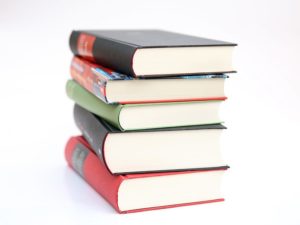 I thought this would be a fun post to share now that the 2017-2018 school year has either begun or will begin soon for many schools in North America.
I thought this would be a fun post to share now that the 2017-2018 school year has either begun or will begin soon for many schools in North America.
As you might have already guessed, English was my favourite subject from the time my mom began the homeschool version of preschool for me until I graduated from college.
My classmates and I read countless short stories, novellas, and novels during those years, but I barely remember ever being assigned a science fiction or fantasy book until I entered college.
This is a real shame. The sci-fi and fantasy genres are full of stories that can be used to as a jumping off point to explore logic, history, math, geography, ethics, and so much more. I wish my classmates and I had been exposed to these genres as an official part of our curriculums from the beginning.
There are five books in each section of this post for the different age ranges: elementary school, middle school, and high school.
Elementary School
Fantasy sure seems like it has a stronger influence on elementary-aged students. I wonder if it’s because of the lure of traditional fairy tales to young children? At any rate, most of my recommendations for this age groups will sit firmly in the fantasy camp.
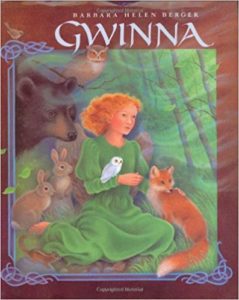
Gwinna by Barbara Helen Berger
I know I’ve blogged about this book before, but I simply must mention it again. This is the most beautiful modern fairy tale that I’ve ever read. It would be a wonderful place to introduce all kinds of classroom discussions about adoption, the dangers of breaking a promise, and what the students think happened to Gwinna after the end of the final chapter.
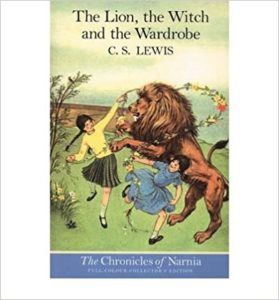
The Lion, the Witch and the Wardrobe by C.S. Lewis
One of the things that first drew me into this story were its descriptions of what life was like for children in England during World War II. There are many things that have changed since then, but basic human nature will always remain the same. It would be very interesting to see how today’s children would react to the idea of being sent away from home for their own safety during a war.
Of course, some students will already have personal experience with that kind of huge life change! Immigration, the separation of families, and the sad consequences of war are still every bit as relevant today as they were in the 1940s.
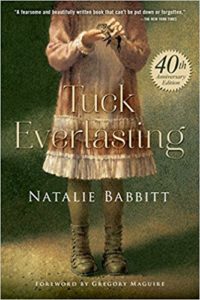
Tuck Everlasting by Natalie Rabbit
I have a vague memory of one of my elementary school teachers assigning this book to us when I was in the fourth or fifth grade. The thought of living forever had never crossed my mind until I learned about Winnie’s life, but I loved watching her mull over her choices once she discovered that the family she’d recently met had a surefire method to remain young and healthy until the end of time.
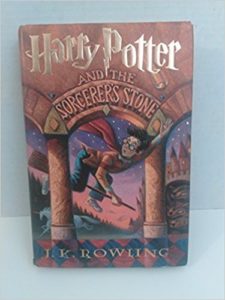
Harry Potter and the Sorcerer’s Stone by J.K. Rowling
This series covered so many timeless issues: child abuse; discrimination; grief; what happens when family secrets are finally aired. What surprised me the most about all of the Harry Potter books was how much fun the characters had even when they were dealing with serious topics that many kids face in real life.

Charlie and the Chocolate Factory by Roald Dahl
I mean, who wouldn’t want to read a book about a factory filled with candy and other sweets?
On a more serious note, I liked the way the main character responded to the difficulties he faced in life. He was such a brave kid even when the odds were stacked against him and he couldn’t imagine how he’d get out of his latest predicament.
Middle School
Middle school is a tough age. Tweens and young teenagers are often suspicious of admitting they like stories they think were written for kids, but they’re also not quite ready for more mature material. These books – or portions of them – would be perfect for this age group.
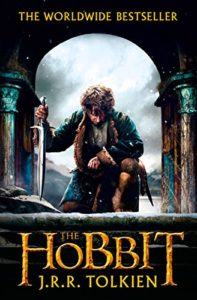
The Hobbit by J.R.R. Tolkien
It takes courage to face an angry dragon, and that was only one of the many dangers Bilbo was exposed to during his first big adventure. If I were going to teach this book, I’d round off our readings with a discussion of what happens to people after other huge changes like going to war or being diagnosed with a serious disease. Bilbo’s response to what happened to him mirrored both of these real-life experiences in all kinds of interesting ways.
This is also the perfect introduction to the the Lord of the Rings universe for students who like Bilbo and want to find out what happened to him after he returned home.
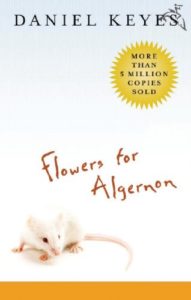
Flowers for Algernon by Daniel Keyes
This book was about a developmentally disabled man who was given an experimental medical treatment that quickly began to raise his IQ. Suddenly becoming much more intelligent than you were before isn’t necessarily an easy experience, but the main character’s diary about what that process was like made me think about everything from how disabilities are defined to what happens when someone is given the chance to change their life in all kinds of unpredictable ways.

The Giver by Lois Lowry
Imagine a society without war, hunger, prejudice, or pain. In fact, all but one of the people in that society couldn’t even begin to tell you what any of those experiences were like.
This was by far my favorite book when I was in middle school. I thought the society the main character lived in was a paradise at first. Figuring out its dark side made me ask myself all kinds of questions about the meaning of life and how much freedom I’d be willing to sacrifice to permanently remove suffering in the world for just about everyone.
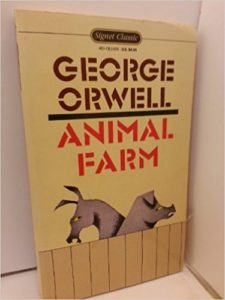
Animal Farm by George Orwell
One of the biggest reasons why I believe this should be read by middle school students is because it distills complicated arguments about freedom, politics, communism, and propaganda into a simple allegory about a farm full of animals who decide to revolt against their owner.
The twist ending is my second largest reason for recommending it to this age group. It was as funny as it was thought-provoking.
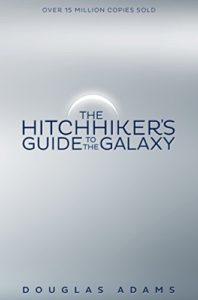
The Hitchiker’s Guide to the Galaxy by Douglas Adams
The silly sections will make middle schoolers laugh, but they’ll also learn a few things about getting along with others and not assuming that you’re the centre of the universe. The sometimes-convoluted storyline would also be a good place to talk abut everything from unreliable narrators to how two people can remember the same event completely differently based on how their minds store memories and what small pieces of that day they’ve forgotten.
High School
My high school English classes assigned us a lot of John Steinbeck and Shakespeare readings. I think these books would make a perfect addition to that kind of curriculum.
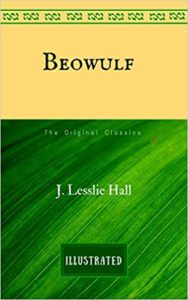
Beowulf
I first read this in college, but I wish I had discovered it years earlier. The dark themes and occasional scenes of violence are best suited for more mature readers who are willing to push forward to the conclusion.
I also believe that everyone who speaks English should be familiar with the first poem we know of that was written in Old English. There is so much about the beginnings of our language that we simply don’t know. Holding onto what we do know is important.
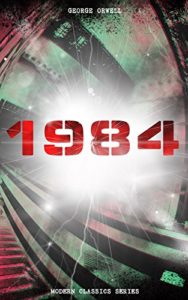
1984 by George Orwell
Should the government be trusted? Is everything that’s shared on the news actually true? How do you know when you’re being lied to?
These have been dangerous questions to ask in many different cultures and eras. Knowing when you’re being deceived is nearly as important as knowing how to react when it happens. I think every high school student should graduate with at least a little practice at weighing what they’re told carefully.
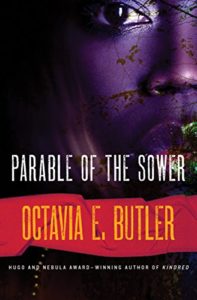
Parable of the Sower by Octavia E. Butler
Climate change has already begun to affect our world. How people live in a generation or two will probably be quite different from how the average westerner lives today.
Ms. Butler had such a creative take on what our future could be like. I wish she had lived long enough to finish this series, but I relish what she was able to write. High school students could learn a lot from her thoughts on prejudice and what happens when an entire society falls apart.

The Time Machine by H.G. Wells
This is a classic piece of science fiction about time travel and the ethical dilemmas that result from knowing what will happen in the future but not being sure how to warn everyone about what is coming. Not every conflict in life has or should have a black-and-white solution.
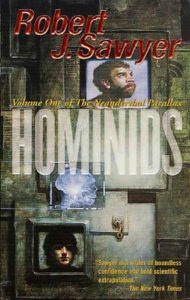
Hominids by Robert J. Sawyer
Most high school students are probably aware that there used to be other human-like species living on Earth, but I doubt most of them have wondered how our planet would be different if early humans had died out and another species had become dominant instead.
This tale asked a lot of hard questions about intelligence, environmentalism, and what it would mean to be human if we discovered that we weren’t the only intelligent hominids wandering around after all.
What science fiction and fantasy books do you wish would be taught in schools?

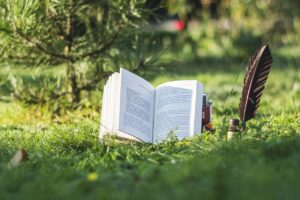 This is going to be a much longer list than the one I had a few weeks ago. I liked to loved most of the assigned reads in school, including:
This is going to be a much longer list than the one I had a few weeks ago. I liked to loved most of the assigned reads in school, including:
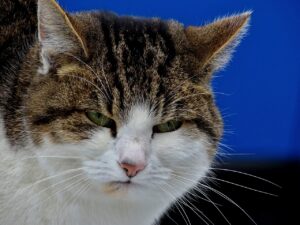
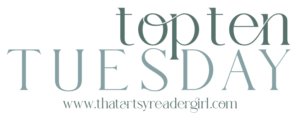
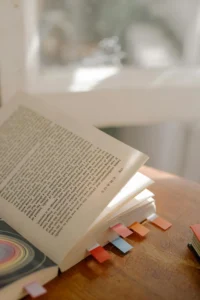 Other than a few rare exceptions (ahem, see #3 on this list which is something I will never revisit), I found something enjoyable about every book I was assigned to read from Elementary school all the way up through university. Some of them even became favourite titles and/or authors of mine!
Other than a few rare exceptions (ahem, see #3 on this list which is something I will never revisit), I found something enjoyable about every book I was assigned to read from Elementary school all the way up through university. Some of them even became favourite titles and/or authors of mine!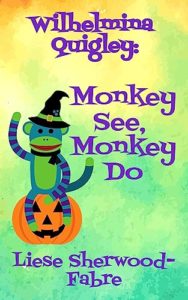 Title: Wilhelmina Quigley – Monkey See, Monkey Do
Title: Wilhelmina Quigley – Monkey See, Monkey Do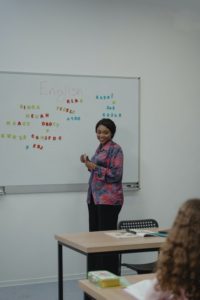 I don’t think anyone will be surprised by this answer, but English was my favourite subject in school.
I don’t think anyone will be surprised by this answer, but English was my favourite subject in school. I thought this would be a fun post to share now that the 2017-2018 school year has either begun or will begin soon for many schools in North America.
I thought this would be a fun post to share now that the 2017-2018 school year has either begun or will begin soon for many schools in North America.













